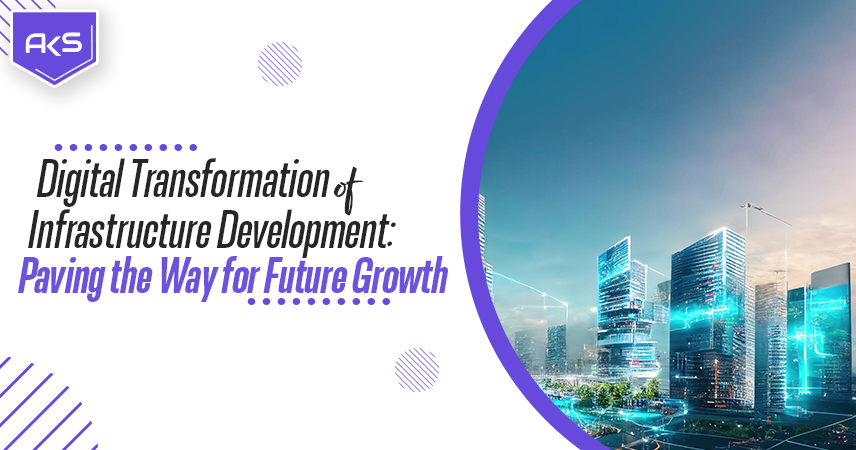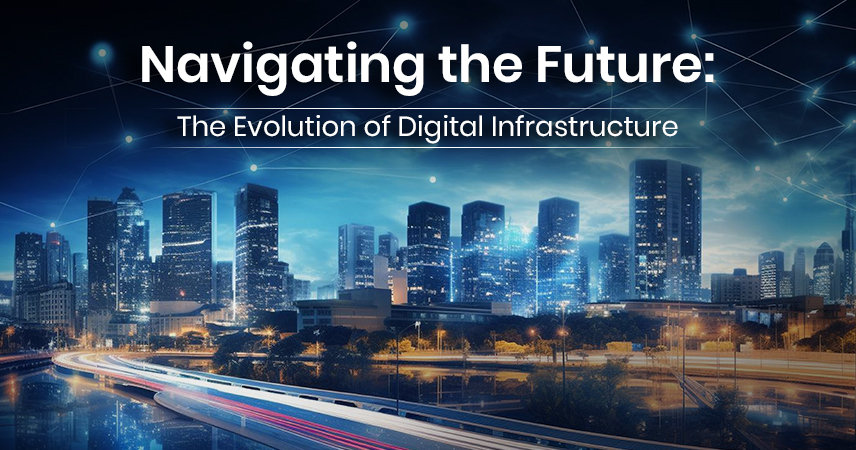
Digital Transformation of Infrastructure Development: Paving the Way for Future Growth
- By Admin
- 06-04-2024

In today's rapidly evolving world, the digital transformation of infrastructure development is playing a pivotal role in shaping the future landscape of cities, transportation, energy, and communication systems. This article delves into the significance of digital transformation in infrastructure, the challenges it addresses, and the opportunities it presents for future growth.
Introduction to Digital Transformation in Infrastructure
Digital transformation refers to the integration of digital technology into all aspects of infrastructure development and management, revolutionizing traditional practices and processes. It encompasses a wide array of technologies such as data analytics, Internet of Things (IoT), automation, and artificial intelligence (AI), among others.
Importance of Infrastructure Development
- Enhancing Economic Growth
Infrastructure development forms the backbone of economic progress by facilitating trade, commerce, and investment. Digital transformation enhances infrastructure's capacity to support economic activities efficiently.
- Improving Quality of Life
Access to quality infrastructure, including transportation, utilities, and communication networks, directly impacts the well-being of individuals and communities. Digitalization ensures that infrastructure is responsive to the needs of society, enhancing convenience and accessibility.
Traditional Challenges in Infrastructure Development
- Funding Constraints
Historically, infrastructure projects have faced challenges in securing adequate funding, leading to delays and compromised quality. Digital transformation offers opportunities for cost optimization and resource allocation through data-driven insights.
- Slow Implementation
The traditional approach to infrastructure development often involves lengthy planning and implementation processes. Digital technologies enable real-time monitoring, rapid prototyping, and agile project management, expediting project delivery.
The Role of Digital Transformation
- Data Analytics in Decision Making
Data-driven decision-making lies at the heart of digital transformation in infrastructure. Advanced analytics tools enable policymakers and project managers to forecast demand, identify bottlenecks, and optimize resource allocation, leading to more informed and efficient decisions.
- IoT and Smart Infrastructure
The proliferation of IoT devices allows for the creation of smart infrastructure networks that can monitor and manage themselves in real-time. From smart meters in utilities to sensors in transportation systems, IoT enhances operational efficiency and responsiveness.
- Automation and Efficiency
Automation technologies such as robotics and machine learning streamline construction processes, reducing labor costs and minimizing errors. Additionally, automated maintenance systems prolong the lifespan of infrastructure assets, ensuring optimal performance over time.
Examples of Digital Transformation in Infrastructure
- Smart Cities
Smart city initiatives leverage digital technologies to enhance urban living experiences. From intelligent traffic management systems to automated waste collection, these initiatives aim to improve efficiency, sustainability, and citizen engagement.
- Intelligent Transportation Systems
Digital transformation has revolutionized transportation systems through innovations such as ride-sharing platforms, autonomous vehicles, and real-time traffic management systems. These technologies enhance mobility, safety, and environmental sustainability.
- Energy Grid Modernization
The integration of renewable energy sources and smart grid technologies has transformed traditional energy infrastructure into dynamic and responsive networks. Digitalization enables efficient energy distribution, storage, and consumption, paving the way for a sustainable energy future.
Benefits of Digital Transformation
- Cost Savings
By optimizing resource allocation and reducing operational inefficiencies, digital transformation can result in significant cost savings for infrastructure projects. Predictive maintenance and asset management strategies minimize downtime and prolong asset lifespan, further enhancing cost-effectiveness.
- Enhanced Sustainability
Digital technologies play a crucial role in promoting environmental sustainability by optimizing resource utilization, reducing carbon emissions, and promoting renewable energy integration. Smart infrastructure systems enable efficient resource management and conservation, contributing to a greener future.
Improved Service Delivery
Digital transformation enhances the quality and accessibility of public services by enabling seamless interactions between citizens and government agencies. From online permitting systems to smart utility meters, digital infrastructure enhances service delivery while improving user experience and satisfaction.
Challenges in Implementing Digital Transformation
- Cybersecurity Risks
The interconnected nature of digital infrastructure exposes it to cybersecurity threats such as data breaches, ransomware attacks, and system vulnerabilities. Ensuring robust cybersecurity measures is essential to safeguarding critical infrastructure assets and data.
- Skill Gaps
The adoption of digital technologies in infrastructure requires a skilled workforce capable of designing, implementing, and managing complex systems. Addressing skill gaps through training and education initiatives is crucial to realizing the full potential of digital transformation.
Case Studies
- Singapore's Smart Nation Initiative
Singapore's Smart Nation initiative aims to leverage digital technologies to improve the quality of life for its citizens. Through initiatives such as sensor networks, data analytics platforms, and digital government services, Singapore is transforming into a highly connected and efficient city-state.
- The Netherlands' Digital Delta Program
The Netherlands' Digital Delta program focuses on enhancing the country's digital infrastructure to address challenges such as climate change, urbanization, and mobility. By investing in technologies such as 5G, IoT, and AI, the Netherlands aims to create a resilient and sustainable digital ecosystem.
Future Trends in Digital Infrastructure
- 5G and Connectivity
The rollout of 5G networks promises to revolutionize digital infrastructure by offering ultra-fast connectivity and low-latency communication. From smart factories to autonomous vehicles, 5G enables a new era of interconnected devices and applications.
- Artificial Intelligence Integration
Artificial intelligence is increasingly being integrated into infrastructure systems to optimize performance, enhance decision-making, and automate routine tasks. AI-driven predictive analytics, maintenance, and optimization algorithms improve efficiency and reliability across various sectors.
- Blockchain in Infrastructure Management
Blockchain technology holds the potential to revolutionize infrastructure management by providing secure and transparent transactional platforms. From supply chain management to asset tracking, blockchain enables decentralized and tamper-proof record-keeping, reducing fraud and enhancing trust.
Conclusion
The digital transformation of infrastructure development represents a paradigm shift in how we plan, build, and manage critical assets. By harnessing the power of digital technologies, we can create more efficient, sustainable, and resilient infrastructure systems that pave the way for future growth and prosperity.




